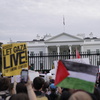
[ad_1]

A demonstrator holds an indication studying “From the river to the sea” at a Freedom for Palestine protest in Berlin on Nov. 4.
Sean Gallup/Getty Images
conceal caption
toggle caption
Sean Gallup/Getty Images

A demonstrator holds an indication studying “From the river to the sea” at a Freedom for Palestine protest in Berlin on Nov. 4.
Sean Gallup/Getty Images
In the times because the Oct. 7 Hamas assault and Israel’s navy response, some Palestinian rights advocates have returned to a standard chorus: “From the river to the sea, Palestine will be free.”
It’s a geographical nod to the land between the Jordan River and the Mediterranean Sea and the protracted tensions between Palestinians and Israeli Jews who stay there.
But what does it really imply? To some, it is a rallying cry for the liberation of Palestinian folks throughout the area, from Gaza to the West Bank and inside Israel. To others, it’s a violent name to erase Israel from existence invoked by militant teams akin to Hamas.
The phrase has change into particularly politically charged within the days because the lethal Oct. 7 assault by Hamas that killed 1,400 folks in Israel. Democratic and Republican lawmakers in Congress have condemned the slogan, with one congressman referring to it as a “thinly veiled call for the genocide of millions of Jews in Israel.”
Outrage over the phrase culminated within the House of Representatives on Wednesday when it voted, 234-188, to censure Democratic Rep. Rashida Tlaib of Michigan after she used the slogan, together with in a put up on social media.
Tlaib mentioned on the House flooring that she was calling for a cease-fire.
“My grandmother like all Palestinians just wants to live her life with freedom and human dignity we all deserve,” she mentioned.
Yousef Munayyer, head of the Palestine/Israel Program at Arab Center Washington DC, says supporters of Palestine who invoke the phrase are sometimes misinterpreted as threatening violence.
“What they are responding to is the fact that, within this space, Palestinians live along with Israelis, but it’s the Palestinians that don’t have freedom,” he mentioned. “They don’t have justice. They don’t have equality. They don’t have safety. They don’t have security.”
According to University of Arizona professor Maha Nassar, the phrase “from the river to the sea” gained momentum within the Sixties amongst a fractured Palestinian inhabitants hoping to interrupt free from the rule not solely of the Israeli authorities but additionally these of Jordan and Egypt.
Nassar mentioned there was “no official Palestinian position calling for the forced removal of Jews from Palestine.”
Later, anti-Israel militant teams akin to Hamas and the Popular Front for the Liberation of Palestine adopted the phrase, in response to the American Jewish Committee.
Some Jews say that what might have been a easy plea for independence cannot be separated from the catchphrase employed by fighters bent on the destruction of Israel.
“Probably it is true that most American college students, for example, who chant ‘from the river to the sea’ do not mean to evoke this idea of ethnic cleansing, do not mean to call for the erasure of Israel or the destruction of all Jews in that land,” mentioned Julie Rayman, managing director of coverage and political affairs for the American Jewish Committee.
“But unfortunately they are echoing that exact trope,” she added.
The Anti-Defamation League says the “hateful phrase” is a denial of Israel’s proper to exist and may go away Israelis and their supporters feeling “unsafe and ostracized.”
According to Rayman, it may well make American Jews with ties to Israel consider they’re unsafe in each nations.
“It is a feeling that the conflict has been exported and that Hamas is on the doorstep, that they are unsafe,” she mentioned.
Yet many individuals insist that “from the river to the sea” is a plea for peace — not violence. Tlaib herself mentioned the phrase is “aspirational call for freedom, human rights, and peaceful coexistence, not death, destruction, or hate.”
Munayyer says it’s important to hearken to what individuals who use the phrase say they imply and never let the slogan’s that means be dictated by essentially the most “extreme elements” of society.
“It’s wrong to put words in other people’s mouths and to silence them when they’re telling you, ‘no, actually, that’s not what this means,'” he mentioned. “If somebody uses this phrase, that doesn’t mean they get to define what it means for everybody else.”
In truth, some have identified that Israelis have used a model of the phrase to check with Israel. The Likud Party of Israeli Prime Minister Benjamin Netanyahu mentioned in its original party platform in 1977 that “between the Sea and the Jordan there will only be Israeli sovereignty.”
Nevertheless, Munayyer and others say Congress ought to direct much less consideration towards what its solely Palestinian American member says and focus as a substitute on easy methods to cope with the continued navy assault and humanitarian disaster inside Gaza.
More than 10,000 Palestinians have died through the Israeli navy’s offensive within the space since early October.
[adinserter block=”4″]
[ad_2]
Source link


